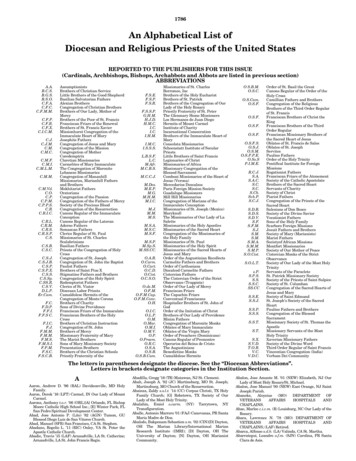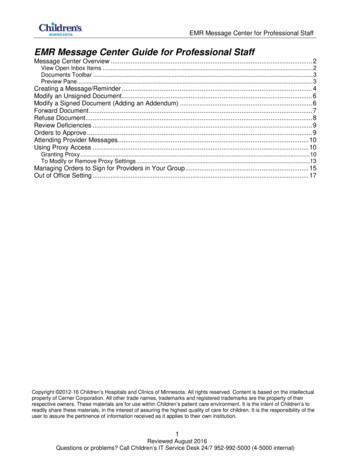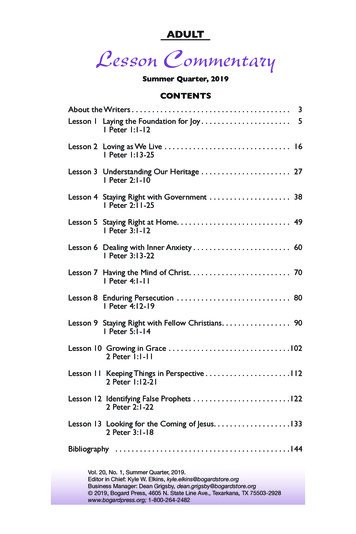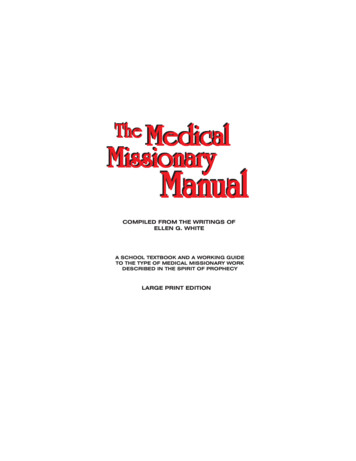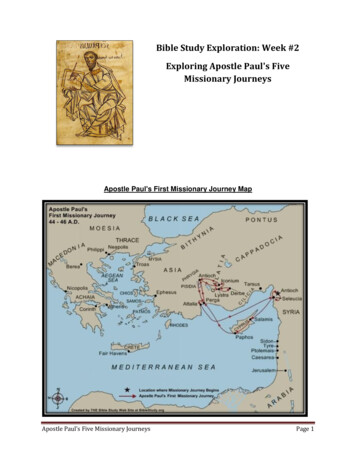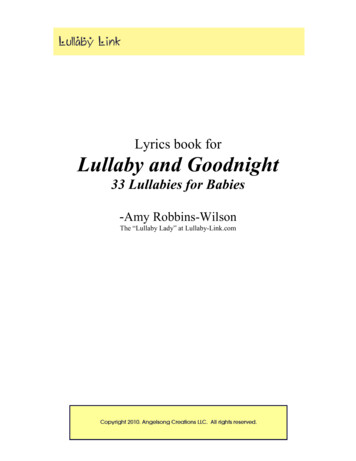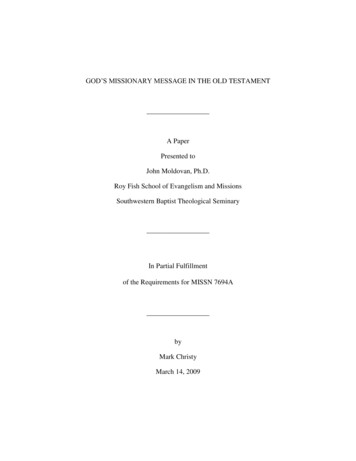
Transcription
GOD‟S MISSIONARY MESSAGE IN THE OLD TESTAMENTA PaperPresented toJohn Moldovan, Ph.D.Roy Fish School of Evangelism and MissionsSouthwestern Baptist Theological SeminaryIn Partial Fulfillmentof the Requirements for MISSN 7694AbyMark ChristyMarch 14, 2009
TABLE OF CONTENTSPageGod‟s Relationship with Humanity .2The Creation Account .2Humanity‟s Response to God.4God‟s Judgment of Humanity .8God‟s Love for Humanity .11God‟s Unique Purpose for Israel .12God‟s Promise to Abraham .12Abraham‟s Intercessory Prayer .14The Election of Israel .15God‟s Vision of Mission .18The First Missionaries .18God‟s Unique Message .19God‟s Promised Messiah .26God‟s Mission in Isaiah 66:18-21 .31Missiological Implications for the 21st Century .34BIBLIOGRAPHY .36Primary Works.36Secondary Works.36Books .36Articles .38ii
GOD‟S MISSIONARY MESSAGE IN THE OLD TESTAMENTThe theology of mission must find its root in God and His initial revelation inthe Old Testament so that the final revelation of Christ in the New Testament can belinked with the God of the OT and connected with His purpose for creation.1 A properunderstanding of God‟s missionary message starts with the acceptance of the Scripturesas the authoritative revelation of God and His mission to mankind.2 As an authoritativewitness, the OT serves as a foundation for the sending out of missionaries as Christcommands in the Great Commission. In the OT, God‟s reveals specifically Hismissionary purpose to restore the broken relationship with sinful humanity.God‟s mission begins with a revelation of Himself and His purpose in the OT.God‟s unique revelation of Himself to humanity even through “the religious particulars ofIsrael” serves as the foundation of His missionary message.3 Paul, Peter, the author of1From this point forward, OT will be used to abbreviate Old Testament, and NT will used toabbreviate New Testament.2D. A. Carson, The Gagging of God: Christianity Confronts Pluralism (Grand Rapids:Zondervan, 1996). Carson provides an excellent discussion on the Bible‟s authority in chapter four.3David Filbeck, Yes, God of the Gentiles, Too: The Missionary Message of the Old Testament(Wheaton, IL: Billy Graham Center, Wheaton College, 1994), 46, 75. Walter C. Kaiser, Jr., Mission in theOld Testament: Israel as a Light to the Nations (Grand Rapids: Baker Academic, 2007), 28. Filbeck arguesthat Israel played primarily a centripetal role in God‟s missionary purpose. Kaiser, on the other hand,suggests that Israel was called to engage in centrifugal missionary efforts from the start. While bothscholars may agree that God is a missionary God, their disagreement over Israel‟s missionary responsibility(centripetal or centrifugal) has implications for how one understands God‟s missionary message in the OT.The author of this paper will attempt to show that God desires all people to hear His message and evenappoints human messengers in the OT to deliver it; however, God‟s decision to separate Israel from theEgyptians, to kill the inhabitants of Canaan, and to remain somewhat indirect in His missionary plans forthe world through the nation of Israel (as a active missionary force engaged in centrifugal missionary work)suggests that God has a unique plan for Israel.1
2Hebrews, and all other NT authors, in one way or another, refer to the OT in deliveringtheir missionary message of the universality of God and His unique message of salvationthrough the promised Messiah.4 This study of God‟s missionary message in the OT willfocus on God‟s relationship with humanity, His unique purpose for Israel, His vision formission, and conclude with pertinent implications and applications for missiology in the21st century.God’s Relationship with HumanityThe Creation AccountIn the Genesis account of creation, God‟s nature is revealed. As sole creator,God is portrayed as both omniscient and omnipotent. His omniscience and omnipotencecan be seen in His creating everything from absolutely nothing. As sole creator, He aloneis to be worshipped as God, since everything owes its existence to Him. Just as thePsalmists praise and worship God because of His creative work, all people need torespond in praise to God‟s self-revelation through His creation.5Humanity, however, must understand, as the creation account illustrates, that“[n]ature is not to be worshipped; it is completely devoid of divinities.”6 Throughout theOT, God is portrayed as the sole being deserving the worship of humanity since Hecreated them. In Job 38-40, God Himself appeals to His creative witness which leads to aworshipful response from Job.4Acts 17:24-28; Rom 1:20; 9; Gal 3:7-9, 28-29; Heb 11; 1 Pet 3:20-21; 2 Pet 2:4-9.5Pss 8:1-9; 19:1-6; 33:6-9; 95:1-5; 148:1-14.6Arthur F. Glasser et al., Announcing the Kingdom: The Story of God’s Mission in the Bible(Grand Rapids: Baker Academic, 2008), 32.
3So that humanity may worship the one true God, God unveils the nature of Hisunique relationship with all peoples throughout the OT beginning with the Genesisaccount of the creation. In the first two chapters of Genesis, God is identified as the soleCreator of everything including humanity; therefore, He possesses an exclusiverelationship with all people. The nature of God‟s relationship with man is a majorcomponent in understanding God‟s missionary message in the OT.The relationship between God and the human race is unique since He alone istheir sole Creator. The relationship is personal since God chose to impart His image topeople exclusively and entrusted the care of the world to them (Gen 1:26).7 The author ofGenesis noted that everything created by God was good and observed that God rested atthe end of His creative efforts (1:31; 2:2).God‟s intention is to establish a peaceful relationship with humanity. God‟slove is first seen in His provision for their needs. Besides His provision of food, He alsogives Adam a suitable mate so that he would not be alone (Gen 1:29; 2:18). God providesAdam and Eve with His presence in the Garden of Eden. Gregory K. Beale considersEden to be the first temple since “God‟s unique presence” was there.8 Just as God has7Gordon J. Wenham, Genesis 1-15, Word Biblical Commentary, vol. 1 (Waco, TX: Word,1987), 29-32; Victor P. Hamilton, The Book of Genesis: Chapters 1-17, The New InternationalCommentary on the Old Testament, vol. 1 (Grand Rapids: Eerdmans, 1990), 134-38; W. Sibley Towner,“Clones of God: Genesis 1:26-28 and the Image of God in the Hebrew Bible,” Interpretation 59 (2005):349-50. A proper understanding of “ םלצ image” may be impossible to attain. The authors of the OT use םלצ a total of seventeen times in various ways including idols (Num 33:52), models (1 Sam 6:5), pictures (Ezek16:17), and philosophical comparisons to man‟s existence (Ps 39:6; 73:20). Etymological interpretation ofthe word from similar roots in Arabic and Akkadian are also inconclusive. After surveying many differentinterpretations, Towner concludes from the context that God‟s gift of His “image” to humanity seems todeal with humanity‟s ability to have a relationship with God, each other, and even animals.8Gregory K. Beale, “Eden, the Temple, and the Church‟s Mission in the New Creation,”Journal of the Evangelical Theological Society 48 (2005): 7.
4loved mankind, God‟s desire and intention is for them to love Him in return (Deut 6:5;10:12; Matt 22:36-38).The creation account reveals the uniqueness of the relationship betweenhumanity and God in several other ways. First, the creation account along with the rest ofthe OT is written strictly for the benefit of people. Second, it shows God‟s intentionalityand purpose in creating the world in such a way that the creation was to be good andpleasing. Third, God‟s unique interaction with people to the exclusion of all other createdworks and beings gives them a special significance. God‟s interaction with Adam andEve demonstrates that God‟s willingness to interact personally with mankind and theirability to respond.Humanity’s Response to GodMore information on the uniqueness of God‟s relationship with humanity canbe gleaned from the Genesis account of the original sin of Adam and Eve. God continuesto express His love by providing a paradise for them (Gen 2:8-16). But within thisparadise He plants a tree, the tree of the knowledge of good and evil, and He tells Adamnot to partake of its fruit lest they die (Gen 2:8-17).9 By giving this command and thesubsequent penalty of death for disobedience, God reveals that His unique relationship9All biblical references in Hebrew in this paper are from the Biblia Hebraica Stuttgartensia.Herold S. Stern, “The Knowledge of Good and Evil,” Vetus Testamentum [VT] 8 (1958): 415; W. MalcolmClark, “A Legal Background to the Yahwist's Use of „Good and Evil‟ in Genesis 2-3,” Journal of BiblicalLiterature [JBL] 88 (1969): 277. After considering and refuting several major views on the meaning of טו ור ה , Stern proposes that it refers to “the exercise of one‟s freedom of choice” (Deut 1:19; Isa 7:1516). Clark seems to agree and adds that humanity has now gained legal and moral autonomy from God andbecome responsible to God for all judgments made by humanity. He points to several verses to support hisargument including Genesis 31: 24 and 29, 1 Kings 3:9, 2 Samuel 14:17, 13:22, and 19:36, Isaiah 5:20 and23, and Jeremiah 42:3 among others.
5with humanity requires obedience. It also reveals that if people have the knowledge ofgood and evil, their relationship with God will be damaged.When Satan appears in Eden in the form of a snake, he comes with a differentunderstanding that opposes the warning given by God (Gen 3:1-4). By counteractingGod‟s warning, Satan demonstrates that he is opposed to God. As a result, anyone whoaccepts his message also becomes opposed to God. When Adam and Eve choose to eatthe fruit, they choose to oppose God by disobeying His command. It is at this point thatGod‟s offer of salvation becomes a necessity for humanity.The unique relationship that God has with mankind is broken. Gilbert Guffinnotes that Adam and Eve‟s “disobedience [is] in essence a rejection of God‟s rightfulsovereignty over [them] and a voluntary submission to the authority of the tempter.”10 Byaligning themselves with the message of Satan and eating the forbidden fruit, theyintroduce death and separation from God to the whole of humanity. A specialintervention of God is now desperately needed to solve the human problem of death andseparation from God.The initial response of God to Adam and Eve‟s disobedience is removal fromEden (Gen 3:22-24). This merciful act of God shows His unwillingness to allowhumanity to exist eternally in sin.11 God then responds to Adam and Eve‟s disobedienceby pronouncing a curse of suffering and death upon them and a curse upon the earth (Gen3:16-19). The death, of which God speaks, is “the death of being like God” and not the10Gibert L. Guffin, The Bible: God’s Missionary Message to Man (Birmingham, AL: Woman‟sMissionary Union, n. d.), 1:38.11Glasser et al., Announcing the Kingdom, 42.
6“death of non-being.”12 Unlike God, humanity cannot physically exist eternally when itpossesses the knowledge of good and evil (Gen 3:22). In spite of the death sentence, Godchooses to preserve the life of Adam and Eve for some time in a “world between curseand promise.”13Even though God condemns humanity to suffering and death in this life, due totheir sin, He also gives them a promise (Gen 3:14-19). In His mercy, God gives themissionary message of victory over Satan, but He also promises that humanity will alsobe wounded in the process (Gen 3:15). In Genesis 3:15, God promises the “ רז seed” ofthe woman will crush Satan‟s head.14 This word is also used in God‟s covenant withAbraham and his “seed” in Genesis 17:7-12. Thus, as Kenneth A. Matthews notes, “thecreation blessing,” which is tarnished by Adam‟s disobedience, is to become“particularized through the Hebrew fathers, who will be instrumental in its realization.”15Paul seems to apply the promise of victory of the woman‟s seed over Satan (Gen 3:15) toChrist when He says, “The God of peace will soon crush Satan under your feet” (Rom16:20).16 God‟s decision to preserve humanity momentarily and give a missionary12Dietrich Bonhoeffer, Creation and Fall: A Theological Interpretation of Genesis 1-3, trans.John C. Fletcher (London: SCM Press LTD, 1960), 88.13Ibid., 85.14Jack Collins, “A Syntactical Note (Genesis 3:15): Is the Woman‟s Seed Singular or Plural?”Tyndale Bulletin [TB] 48 (1997): 142-44. Collins discusses whether or not the woman‟s רז denotes acollective group (humanity) or to an individual. When רז is collective, it can have “a singular verbinflection” (Gen 13:16), “a plural verb inflection” (Exod 32:13), singular adjectives (Ps 112:2), or pluralpronouns (Gen 17:9). Collins notes רז refers to a single person when it “appears with singular verbinflections, adjectives, and pronouns” (Gen 4:25; 21:13; 38:9; 1 Sam 1:11; 2 Sam 7:12-15; Isa 41:8).15Kenneth A. Matthews, Genesis 1-11:26, The New American Commentary, vol. 1A(Nashville: Broadman & Holman, 1996), 246.16All biblical references in English in this paper are from the New International Version (NIV);Francis X. Peirce, “The Protoevangelium,” Catholic Biblical Quarterly 13 (1951): 246. Like Paul, Peirce
7message of victory to humanity over Satan expresses the loving nature of God and giveshope to them, even while they struggle with God‟s message of wrath due to their sin. Godalso expresses His love for Adam and Eve by providing them with clothing, a needbrought on by their entrance into a sinful state (Gen 3:21).Throughout the OT, from the time of Adam and Eve, humanity struggles withthe awfulness of sin. Adam‟s firstborn, Cain, never had access to the tree of life and hisactions suggest that he seeks the fruit of death (that is the destruction of life) even moreso. Cain‟s jealousy of his brother Abel, due to God‟s acceptance of Abel‟s sacrifice, leadshim to murder his brother (Gen 4:3-8). After God confronts Cain for his horrific act, heasks God, י חי ה מר “Am I my brother‟s keeper?” (Gen 4:9). Kristin M. Swensonconnects Cain‟s question and the implied answer of yes with God‟s appointment ofhumanity to a caretaking role in Geneses 2-3.17 Like Adam and Eve, Cain chooses todisobey God‟s will that mankind care for the world (which includes people caring for oneanother) by harming his brother. Cain and Abel, as immediate descendants of Adam andEve, represent the nature of the relationship of the human race within itself and with Godafter expulsion from Eden.Cain‟s behavior shows the awfulness of the sinful nature within humanity. Hisconduct toward Abel and God‟s condemnation of Cain demonstrate the destructiveness ofsin in regard to human relations with each other and God. Even in the midst of God‟scondemnation of Cain, He still demonstrates His grace to a fallen humanity by markingunderstands the Protoevangelium (Gen 3:15) to be referring to Christ and appeals to the authoritativewitness of OT prophecies and the NT revelation of Christ as proof.17Kristin M. Swenson, “Care and Keeping East of Eden: Gen 4:1-16 in Light of Gen 2-3,”Interpretation 60 (2006): 374.
8Cain with a sign so that no one would kill him (Gen 4:15). God‟s sending of Cain awayfrom His presence shows that a relationship with God must not be marred by sinfulbehavior (Gen 4:16). God‟s affirmation and acceptance of Abel‟s sacrifice proves thatGod is willing to pursue a relationship with people despite its newly proven fallen state.While this relationship is still unique, it now comes with certain conditions, introducedby the disobedience of the human race. God now serves as the universal judge of allnations who accepts the right actions but rejects the wrong ones.God’s Judgment of HumanityGod‟s judgment of humanity‟s disobedience which begins with His curse ofAdam and Eve and their expulsion from Eden is a universal theme in the OT. Accordingto Genesis 6:5, the sinfulness of mankind becomes so great that God becomes willing todestroy every living being. God‟s decision to judge the nations, due to their sinfulactions, demonstrates that all humanity is accountable for their behavior to God. “God‟swrath” in response to humanity‟s sin, J. Hebert Kane observes, “makes the gospelnecessary” and [h]is love makes it possible.”18While humanity is accountable to God, He proved many times throughout theOT that He is also merciful. Noah, a righteous man, receives salvation from God‟sjudgment which comes in the form of a flood (Gen 6:9). While this salvation may havenot been eternal, it does display God‟s desire to show mercy to humanity even in themidst of His great wrath due to their sinfulness. God‟s protection for the animals (which18J. Herbert Kane, Christian Missions in Biblical Perspective (Grand Rapids: Baker, 1976), 20.
9would have otherwise been destroyed) and the ark are further examples of His lovingnature, despite the severe judgment that was about to occur.After the flood, God renews His original blessing to humanity and makes acovenant with Noah and his sons (Gen 1:28; 9:1, 9). Since all humanity aside from Noahand his family were destroyed in the flood, the covenant and blessing that God renders toNoah and his sons are unique between God and all nations. As a righteous man whoclearly receives special favor from God, Noah‟s actions toward God are instructive forevery person who desires a right relationship with God. In Genesis 6:18, God promises toestablish a covenant with Noah which Noah accepts by faith.19 Noah‟s faithful responseis seen in his obedience to God‟s commands concerning the building of the ark and otherpreparations for the coming judgment (Gen 7:5, 9, 16). After the flood, Noah, theforefather of all humanity, further demonstrates how humanity is to relate to God byoffering sacrificial worship that is acceptable to God (Gen 8:21-22).Part of the Noachian covenant includes a command to humanity to scatteracross the earth as they increase in population (Gen 9:1). Humanity, however, decides todisobey this command by building the tower of Babel that would reach to the heavens toprevent themselves from being scattered across the earth (Gen 11:4). Another reason fortheir construction of the tower is to exalt themselves (Gen 11:4).20 Just like Adam andEve, fallen humanity disobeys the command of God and seeks to exalt themselves at the19Heb 11:7.20Theodore Hiebert, “The Tower of Babel and the Origin of the World‟s Cultures,” JBL 126(2007): 36. Hiebert considers human actions in Babel to be an expression of their desire for cultural unity.He rejects the theme of “pride” because the word for pride is not found in the passage. Hiebert is right insaying that the word “pride” does not appear; however, as he even admits, most scholars see the concept(plot) of human pride and sinfulness in the story.
10same time. At this time, there is no sign of acceptable worship of God (like that done byNoah); rather, people are arrogantly pursuing their own direction. God‟s judgment is toconfuse their language and scatter them across the earth (Gen 11:7-8). It, however, is alsograceful because He seeks to restrain the sinful behaviors of people who would havecontinued to descend further into depravity and disobedience by separating them.God‟s judgment against human sinfulness continues to be expressed in Hisdealings with humanity through Israel. As Joshua and the Israelites come into Canaan,they kill many of the inhabitants, according to the will of God.21 In Deuteronomy 7,Moses expresses God‟s hatred for the sinful practices of the Canaanites, His judgmentagainst them at the hands of Israel, and His desire for Israel to be holy and removed fromsuch practices. God‟s judgment against the nations is expressed in many oraclesthroughout the Prophets.22God judges the nations for their sins just like He judges His chosen peopleIsrael. He works through Israel to judge the other nations, and He uses the other nationsto judge Israel.23 In the course of serving God‟s purpose of punishing Israel‟s sins, thosenations, who arrogantly mistreated the Israelites, are also judged by God (Isa 10:12-19;Jer 25:11-14). Thankfully, God‟s relationship with the nations is not limited to Hisjudgment of their sins.21Deut 7:21; Josh 6:21; 8:24; 10:28-42; 11:14.22Isa 13-23; Jer 46-51; Ezek 25-32; Dan 2; 7-11; Joel 3:1-16; Amos 1:3-2:3; Obad; Nah 1-3;Zeph 2:4-15; Zech 9:1-8; 12:1-9; 14:12-19.23Deut 9:4-5; Judg 4:1-3; Isa 7:18-20; Neh 9:27.
11God’s Love for HumanityGod‟s love for the nations can been seen through the interaction of Israel andthe surrounding peoples. Pharaoh and the Egyptians, for example, treat Israel harshlybefore the Exodus. But God does not act immediately; rather He patiently prepares Mosesand sends him to talk to Pharaoh. God allows Pharaoh to stubbornly refuse to submit toHis will, despite the severity of his suffering and that of the Egyptians so that His “namemight be proclaimed in all the earth” (Exod 9:16). God‟s intentions, however, go beyondHis desire to be known as God: “Blessed be Egypt my people, Assyria my handiwork,and Israel my inheritance” (Isa 19:25). John D. W. Watts considers this verse to be “oneof the most universal statements of Yahweh‟s intentions in Scripture.”24 While Hisblessing is to occur in the future, this verse reveals God‟s ultimate intent to bless allpeoples.During the exile to Babylon, God commands His people to “seek the peace andprosperity of the city to which I have carried you into exile. Pray to the Lord for it,because if it prospers, you too will prosper” (Jer 29:7). Commenting on this verse, GeraldL. Keown, Pamela J Scalise, and Thomas G. Smothers note the “transfer of blessing andprotection from Jerusalem (26:6) and Babylon (29:7)” according to Jeremiah.25 Godshows amazing concern for both His people, whom He sends into exile, and the captorswho attack His people. God now asks His people to pray to Him for the city‟s prosperity.24John D. W. Watts, Isaiah 1-33, Word Biblical Commentary, vol. 24 (Waco, TX: Word,1985), 261.25Gerald L. Keown, Pamela J Scalise, and Thomas G. Smothers, Jeremiah 26-52, WordBiblical Commentary, vol. 27 (Dallas: Word, 1995), 72; Jer 14:11-12.
12God‟s love for humanity can be seen in how He chooses to deal with KingNebuchadnezzar of Babylon, who had become prideful (Dan 4:37). The king is living“content and prosperous” despite his sinfulness when God sends him a frightening dream(Dan 4:4-5). The king further displays his unwillingness to repent from his sinful state byturning to “magicians, enchanters, astrologers and diviners,” who offer no comfort, untilhe finally turned to Daniel, whom he knows to be God‟s servant (Dan 4:6-8). Daniel tellsthe king that he is going to be driven mad until he acknowledges that God is over all thenations and even determines who will rule the nations. At the end of his experience,Nebuchadnezzar comes to the correct conclusion that God is the universal sovereign ofall nations who is able to personally address the sinful behaviors of humanity (Dan 4:37).God‟s actions toward the whole of mankind demonstrate His desire for aunique relationship with all people that comes with a unique mandate requiring obediencefrom all humanity. Even though humanity fails to relate to God obediently, God displaysHis mercy by taking measures “to avoid destroying the whole human race.”26 He removesthem from Eden after they eat the forbidden fruit, scatters them after they build the towerof Babel, provides the ark for Noah before He sends the flood, and makes a covenantwith Abraham to bless all nations through him.God’s Unique Purpose for IsraelGod’s Promise to AbrahamGod, in Genesis 12:3, delivers a promise to Abraham: “I will bless those whobless you, and whoever curses you I will curse; and all peoples on earth will be blessed26Glasser, Announcing the Kingdom, 52.
13through you.”27 God reiterates His promise to Abraham, Isaac, and Jacob several moretimes (Gen 22:18; 26:4; 28:14). God‟s particular choice of Abraham will lead to allpeoples of the earth being blessed.28 Gordon J. Wenham points out that God‟s promise toAbraham, Isaac, and Jacob is for the purpose of the restoration of humanity back to fullrelationship with God as they had originally in Eden.29 Paul understands this promise tothe Patriarchs of blessing to the nations as the gospel being announced in advance (Gal3:8).30Other aspects of God‟s message through Paul can be seen in God‟s relationshipwith Abraham. When God promises Abraham a son in his old age, Genesis 15:6 states:“Abram believed the Lord, and [H]e credited it to him as righteousness.” Paul appeals tothis verse multiple times when he delivers the Gospel of justification by faith (Rom 4;Gal 3). Paul observes that Abraham is called righteous by God for simply believing Godas opposed to following the Law which, of course, is not even in existence at that time.27Wenham, Genesis 1-15, 277-78; Hamilton, The Book of Genesis: Chapters 1-17, 374-76;Kenneth A. Matthews, Genesis 11:27-50:26, The New American Commentary, vol. 1B (Nashville:Broadman & Holman, 2005), 117-18; Claus Westermann, Genesis 12-36: A Commentary, trans. John J.Scullion (Minneapolis: Augsburg, 1981), 151-52. Much debate exists over whether not ו ר in Genesis12:3 is reflexive “will bless themselves” or passive “will be blessed.” Since God is the ultimate source ofblessing in this passage as well as the rest of the OT, a passive translation is preferable. While the reflexivemay be grammatically possible, it can only be acceptable if the authority of other books in the OT is placedin question.28John Stott, The Contemporary Christian: Applying God’s Word to Today’s World (DownersGrove, IL: InterVarsity, 1992), 326. Stott considers Genesis 12:1-3 as “the most unifying text” in Scripturebecause it demonstrates that God‟s particular choice of Israel is only in service to His divine plan to blessall humanity.29Wenham, Genesis 1-15, li.30C. John Collins, “Galatians 3:16: What Kind of Exegete Was Paul,” TB 54 (2003): 85.Assuming that Paul is referring to Genesis 22:18 in Galatians 3, Collins affirms Paul‟s argument that רז refers to a singular individual, namely Christ, since it takes a singular pronoun.
14In Galatians, Paul notes that God‟s promises to Abraham are given to him andhis seed (Gal 3:16). Some scholars debate whether or not God‟s promise to Abraham‟sseed refers to Abraham‟s descendants or a collective group. According to Robert A.Pyne, Genesis 22:18 applies God‟s promise to Abraham and his collective seed in ageneral sense.31 When God reiterates His promise to Isaac and Jacob in Genesis 26:4 and28:14, He narrows His promise first to Isaac and his descendants and then to Jacob andhis descendants. The twelve tribes of Israel were then formed through the twelve sons ofJacob. Afterwards, the OT revelation occurs primarily through God‟s relationship withIsrael and their relationships with each other and the nations. Although Paul applies thepromise of God to Abraham‟s seed to Christ, he also understands God‟s promise toAbraham‟s seed as having a collective sense (Gal 3:16, 29; Rom 9:7-8). In Romans 9:7-8,Paul calls the seed of Abraham those who possess the faith of Abraham, in other words,those who know Christ (Gal 3:29).Abraham’s Intercessory PrayerAfter the call of Abraham, God displays His judgment on the sinfulness ofhumanity in His dealings with Sodom and Gomorrah. Unlike His previous judgments,this time God chooses to reveal His intentions to Abraham and then converses withAbraham before acting on those intentions. While God‟s missionary message of theawfulness of sin is quite apparent in the actions of those living in Sodom and Gomorrahand His subsequent actions to destroy both cities and their inhabitants, the most uniqueaspect is God‟s willingness to engage Abraham before displaying His wrath.31Robert A. Pyne, “The „Seed,‟ the Spirit, and the Blessing of Abraham,” Bibliotheca Sacra[BS] 152 (1995): 212.
15One may consider Abraham‟s supplications for the people of Sodom andGomorrah as the first missionary act. As a called out representative of God, he engages inintercessory prayer for the peoples of Sodom and Gomorrah. Ce
the Old Testament so that the final revelation of Christ in the New Testament can be linked with the God of the OT and connected with His purpose for creation.1 A proper understanding of God‟s missionary message starts with the acceptance of the Scriptures as the authoritative revelatio
